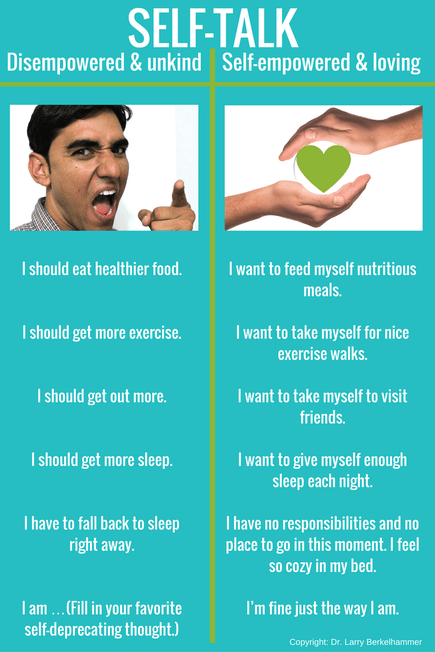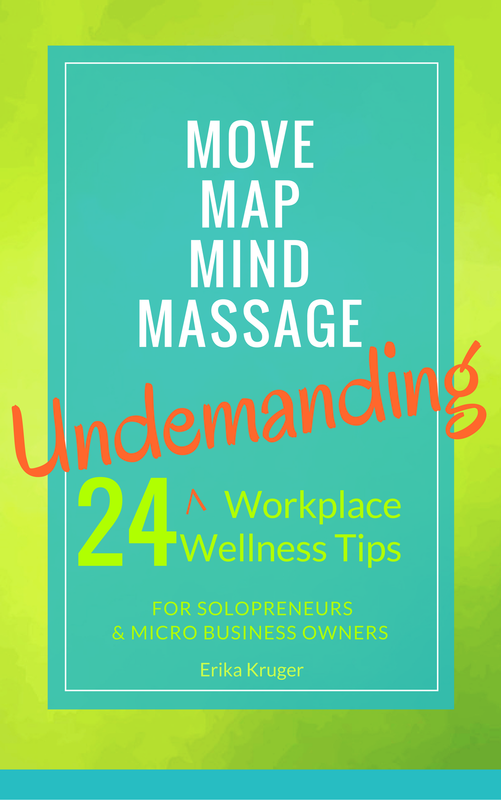|
We really have no excuse.
Thanks to our high standard of living we have moved beyond basic survival needs. We have the Internet that puts all the information about health and wellness at our finger tips.We have clever apps on our electronic devices to support our good intentions. And we can employ people like massage therapists and personal trainers and dieticians to support our efforts. Yet something still prevents us from putting intenstions and desires for healthy living into practice. Very often that something is the way we think and the way we talk about health and wellness.
Our own perceptions and conversations undermine our efforts to change our habits.
The underlying worldview which we express through our choice of words, our attitudes, evaluations and perceptions spoken out loud, all of these can either support or weaken our efforts to improve health habits. But more than what we tell others, it is our inner conversations that chip away at our resolve. In psychology, this constant chatter of our inner voice is referred to as self-talk. Self-talk can be a truly positive force expressing self-validation, personal efficacy, optimism, hope, joy. It fills us with enthusiasm and anticipation. But self-talk can also be self-critical, unsympathetic and unkind preventing us from making progress. t stops us from making peace with ourselves causing mental and emotional destruction and a lack of self-confidence. We can shore up or undermine ourselves with our words.
However it is not only our psyches which are affected by these incessant monologues of the mind.
Our style of self-talk affects our physiology - our brains and our bodies. BODY BASHING Consider our dissatisfaction and dislike of our own bodies. I am not talking about eating disorders or body dysmorphic disorder (BDD), a type of obsessive compulsive disorder in which the person incessantly think about their real or perceived flaws causing extreme anxiety. I refer to the everyday insecurities we all have about our bodies, a mindset which is fed by the current culture of celebrity worship and the obsession with physical appearance. Of course the media's wily ways with photo enhancing techniques deepen our unrealistic expectations of what we should look like. Our self-talk about our bodies and our health, instead of celebrating this miracle which is us, becomes destructive. We are never good enough, beautiful enough, thin enough and even healthy enough.
I see this in my massage practice way too often. Some clients feel obliged to apologise to me about their bodies.
Still worse, there are others that are so embarrassed they would rather forgo the experience and health benefits of massage than take off their clothes. (And that despite the fact that clients are covered throughout the treatment.) THE STRUGGLE FOR PERFECTION Another factor that negatively affects our self-talk about our bodies and wellness is society’s obsession with being healthy as a goal in itself. Life becomes a struggle to reach the perfect physical condition. Our sole purpose is to be fit, beautiful, thin and above all flawless. To achieve that, we have to be prepared to put in buckets full of effort, time, dedication and resources. We do not strive to be healthy in order to live our purpose. No, being healthy becomes the purpose.  Organising my thoughts while walking on Strand beach. Photograph: Martin van Niekerk Organising my thoughts while walking on Strand beach. Photograph: Martin van Niekerk
For some people (personal trainers and athletes for example) it makes sense but for me this obsession with perfection is not only intimidating but also boring and futile.
I walk to go to the library or to clear my head. I run to catch Rosie, the mutt, when she escapes. I stretch to stay supple in order to do my job. But that is me. Other people have more strenuous ways of enjoying their bodies. And that is fine too as long as you enjoy using your body in the moment. Let us get back to self-talk. SELF-TALK FOR HEALTH There is no doubt that the way you talk to yourself influences your health and wellbeing. Dr. Larry Berkelhammer, a retired mind-body medicine psychologist and author of the book In Your Own Hands; New Hope for People with Chronic Medical Conditions use these examples of disempowering self-talk versus self-empowering or healthy self-talk to prove the point.
Do you notice the pattern? Are you misusing the word 'should' too? Do you have expectations about yourself that turn to resentments if you don't succeed?
HERE IS HOW TO CHANGE THE INNER-CHATTER Follow these three steps to direct negative self-talk towards kinder, self-empowering statements and towards better health.
Eventually epowering and supporting self-talk will become your mental mother tongue. The upshot is improved motivation to practice optimal self-care as well as reduced stress and a greater sense of wellbeing. Worth watching your tongue, isn’t it?
3 Comments
|
Erika KrugerI am Erika Kruger, self-care skills trainer & mentor. I am here for every person who realises that their wellbeing is THEIR business. Categories
All
|





